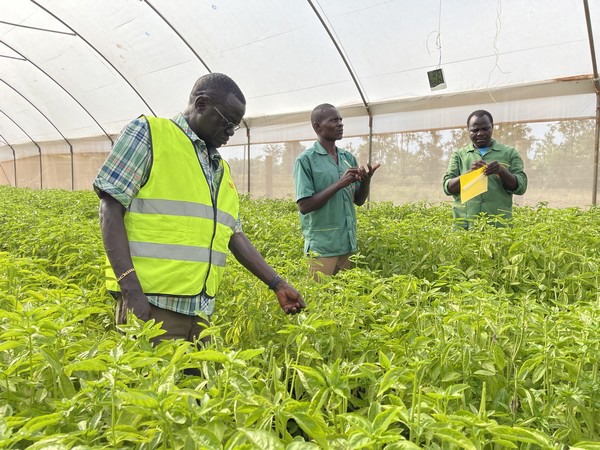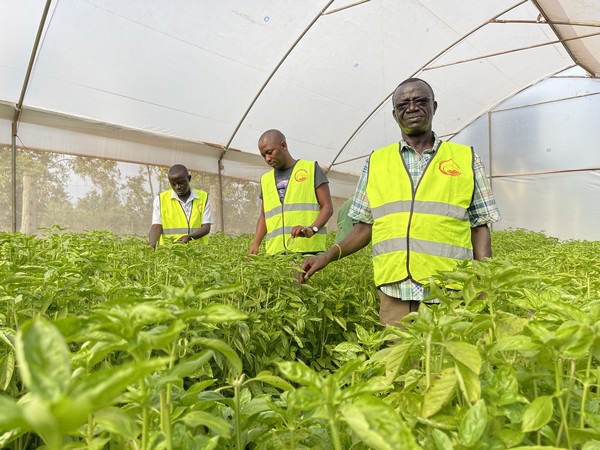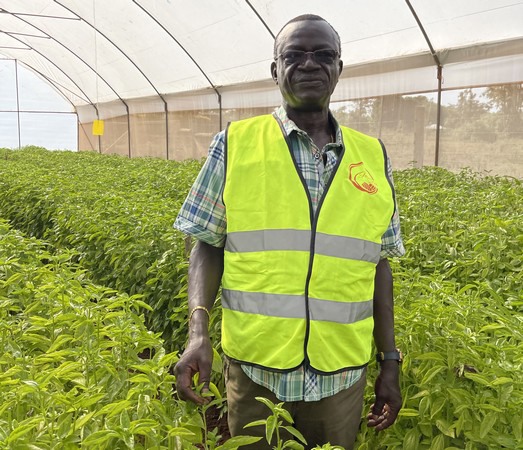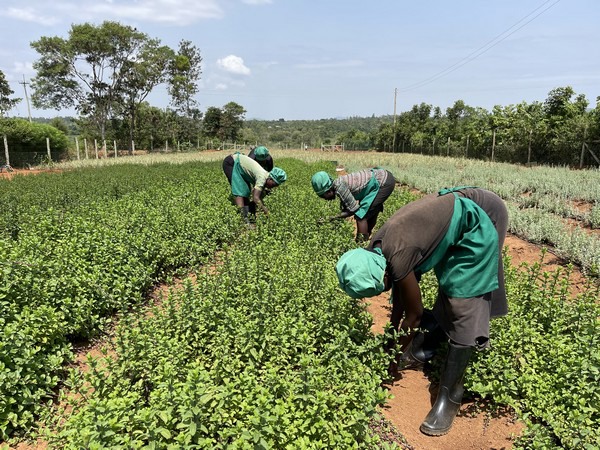A farming revolution is taking shape in Siaya County of Western Kenya, chaperoned by a former civil servant who has transformed swathes of traditionally unfarmed land into an oasis of herbs and spices. The herbs and spices farming has captured international markets while creating a new age farming renaissance in an area that has traditionally been synonymous with the farming of traditional low-yielding crops like maize and beans. It is a revolution that has now attracted cardiologists, engineers, and lecturers who are now trying their hand at herb farming.

Mr. Joseph Opondo, the Director of Tangla Gardens, who has worked for close to 40 years in public service, got a light bulb moment following years of travel that exposed him to modern farming while pointing him to the yawning gap between production and demand for the herbs and spices market that is estimated to be about $79 billion in 2022 and poised to grow to $126 billion by the end of 2023.
He rented bushy land and started the herbs and spices farming journey in August 2021. With help from agronomists, he set aside 8 ha to farm a basket of herbs such as Oregano, thyme, basil, chives, parsley, sage, peppermint, coriander, rosemary, French Tarragon, Flat parsley balm, lemongrass, and garlic.

With the farming of the high-value crops requiring specialized training, Tangla Gardens has tapped into the services of the National Youth Service, NYS, a Government of Kenya organization that trains young people in various skills of national importance. The six NYS graduates who have been trained in agriculture manage the farm and have been pivotal in transferring the knowledge to the local workforce, the majority of which were women. The staff has undergone theoretical and practical training on the farming of the herbs, including planting, bed maintenance, manicure spacing, weeding, irrigation harvesting, and packaging. With the new job, they are guaranteed to be able to take care of household needs and pay school fees for their children.
The women not only earn an income from tending to the farm but have even formed their own welfare group dubbed Tangla Smart Self Help Group to grow their economic fortunes.
They save and offer loans to each other through a credit model dubbed table banking, where they extend funding to each other and act as each other’s guarantors.
“I have not had consistent employment for a long time. But the herbs farming in Tangla Gardens gave me job security and economically empowered me to take care of my family's needs and pay school fees for my children. I have also benefited from training in new-age farming, which I hope to apply to my own farm as well,” said Justine Awino, one of the workers at Tangla Gardens.

The farm has also opened its doors to agriculture students who are on their industrial attachments to perfect their skills.
This has been the farm’s contribution to social-economic development and the country’s GDP while addressing the challenges associated with the youth bulge and desperation due to lack of employment.
“We are driven by the Mantra ‘Think Tangla, Think of opportunities.’ The herbs and spices farming revolution that we have initiated in an area that has traditionally been regarded as dry is meant to motivate more farmers to embrace high-yielding, high-value crops that will give the farmers more returns and economically empower them. We have shown that it can be done, and this is our response to the clarion call by the government to take our own initiative in addressing food insecurity,” Joseph says.
Tangla Gardens has worked on maintaining the highest levels of good agricultural practices and environmental sustainability by judicious use of water through drip irrigation, filling of gallows to mitigate against soil erosion, and training its 25 laborers on sustainable farming practices.
As a result, the company has attained Global GAP certification for the environment and good agricultural practices.

“Siaya area has very good soil and fertile land, trainable local youth and women, availability of unexploited land for farming, availability of water to farm throughout the year, and proximity to the airport, which makes it very ideal to farm for export. These factors have placed Tanga Garden in a pole position to be a pioneer exporter of herbs and spices from Western Kenya. We are glad that it is taking shape,” said Simon Andys, an agronomist and founder of Premier Seed, a frontrunner in the business of vegetable seed distribution, agronomic support, and herb business. Simon has been the expert behind transforming Tangla Gardens into a herbs and spices powerhouse.
Tangla Gardens has already made shipments of chives, thyme, mint, peppermint, rosemary, and oregano to the Netherlands and is working on delivering more orders to Italy and the rest of Europe.
The company is also in talks with Inspira Farms, a company that works with agribusinesses and exporters on cold chain solutions to construct a modern packhouse to expedite the sorting and packaging of the herbs. The company is also betting on the proximity to the Kisumu International Airport to increase export volumes.
Joseph draws his inspiration from the eagle that soars in search of opportunities while defying numerous odds. It is evident in the numerous mementos that don his office, from pen holders shaped in the form of an eagle to mugs with engravings of eagles. His growth strategy is clear: “There is a growing demand for these spices and herbs, especially by a burgeoning middle class who are keen on their health, and we are warming up to meet this booming demand by increasing the variety of herbs and area under production. We want the world to enjoy freshly grown herbs from this side of Africa even as we contribute to the general health of the citizens of the world. We respond to market needs,” Joseph added.
For more information:
Tangla Gardens
www.tanglagardens.com
